From 1 January 2024, the Malaysian Investment Development Authority (MIDA) will assume the centralised investment promotion and marketing functions of the federal-level investment promotion agencies (IPAs), aimed at enhancing the nation’s IPA landscape. This consolidation will streamline investment-related functions and roles across regional economic corridors, eliminating duplication and simplifying the investor journey in Malaysia. By doing so, MIDA will provide a more cohesive and efficient platform for investors to navigate the country’s investment opportunities.
By partnering with various stakeholders, including government agencies, industry players, and local communities, the IPAs aim to accelerate the implementation of strategic projects, enhance infrastructure development, promote key sectors, and stimulate economic growth in alignment with the overall objectives of the regional economic corridors. Additionally, they serve as key intermediaries in supporting the growth of industries, nurturing talent, and advancing innovation to boost competitiveness and sustainable development within their designated economic zones.
This whole-of-government and whole-of-nation approach is also aimed at enhancing the investment and industrial ecosystem which is conducive for investors to support the development of new and current sectors.
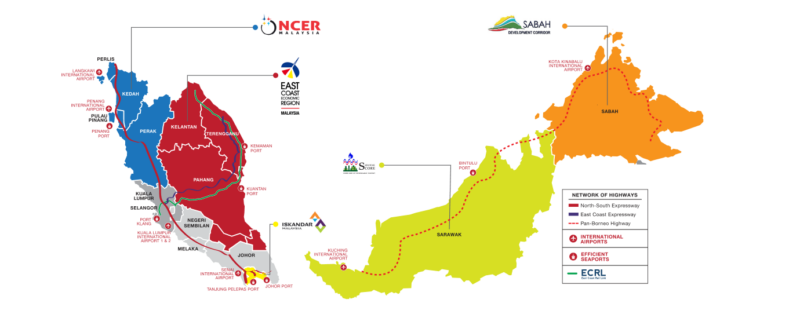
Malaysia's Regional Economic Corridors and Major Infrastructural Facilities
Developed Industrial Park
World-class infrastructure and ease of doing business are crucial factors for investors when making investment decisions. Malaysia has over 500 industrial parks designed to cater the needs of various industries, including small-scale industries enterprises, halal industries, biotechnology, eco-parks and high-technology sectors. These parks are developed and managed to ensure a conducive and business-friendly environment for investors.
Excellent infrastructure and amenities, including easy access to major towns, reliable electricity and water supply, high-speed broadband (HSBB) up to 1GBps, gas pipelines, logistics and storage facilities, factory security, ready-built multi-storey facilities, and ‘plug and play’ zones are readily available. These features help reduce start-up costs for investors and facilitate the smooth implementation of projects in Malaysia.
Major industrial parks in Malaysia operate on a cluster-based model, providing end-to-end services that address the entire industrial value chain. Notable examples of these cluster-based industrial parks include Kulim Hi-Tech Park (KHTP), Batu Kawan Industrial Park (BKIP), Samalaju Industrial Park (SIP).

Robust Utilities Infrastructure
Industrial parks feature well-planned infrastructure, including roads, utilities services (electricity, water, gas, telecommunications), drainage systems, and waste management facilities. These resources are readily available and easily accessible in industrial parks to support businesses effectively.

Facilities
They offer modern facilities such as industrial buildings, warehouses, office spaces, research and development centres, training facilities, and recreational areas to cater the needs of various industries.

Services
Industrial parks provide services such as one-stop centres for permits and approvals, business support, security, maintenance, and logistics assistance to facilitate business operations.

Cluster Development
Certain industrial parks are dedicated to specific industries or sectors to foster collaboration, innovation, and synergies among companies operating within the same cluster.

Investments Incentives
Industrial parks may offer incentives such as tax breaks, grants, financial assistance, and preferential treatment tailored to the investors and to further promote business growth.
Catalysts of Growth: Unlocking Investment Opportunities Across Malaysia's Strategic Economic Corridors
Malaysia’s economic corridors are designed to harness the unique strengths and resources of specific regions, driving balanced development across the country. Each corridor is focused on high-potential sectors such as manufacturing, agriculture, services, and energy, fostering innovation and investment. Strategic initiatives, supported by regional incentives, aim to create sustainable growth, job opportunities, and improved living standards. The highlighted regions on the map, from the Northern Corridor to the East Coast, Iskandar, Sabah, and Sarawak, illustrate the diverse industrial hubs and economic zones contributing to Malaysia’s global competitiveness.
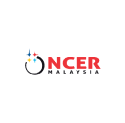
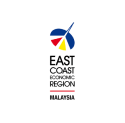
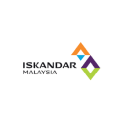
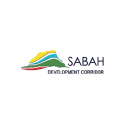

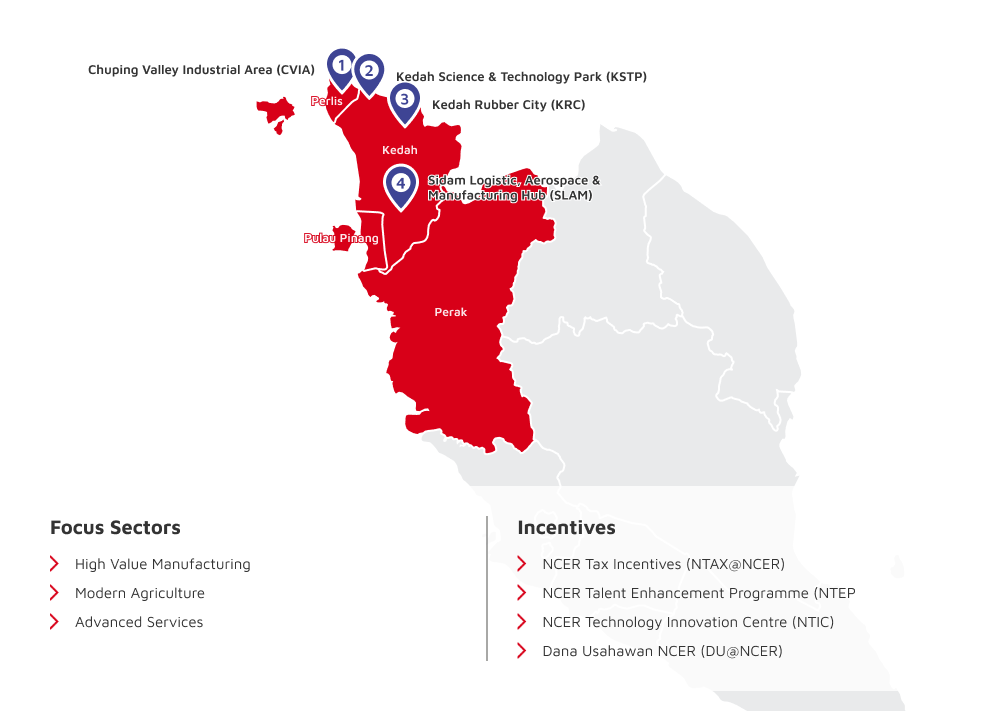
Value Propositions
The economic corridors in Malaysia offer compelling value propositions to investors, businesses, and stakeholders looking to capitalise on strategic opportunities and drive growth. Some key value propositions provided by these economic corridors include:

Strategic Location
Situated at the heart of major global trade networks, Malaysia’s economic corridors offer unparalleled access to key markets in Asia, Europe, and the Middle East. The East Coast Rail Link (ECRL) amplifies these opportunities by improving connectivity between the East and West Coasts of Peninsular Malaysia, enabling smoother and more efficient logistics, trade, and movement of goods.

Incentives and Support
Special economic zones offer a range of fiscal incentives, primarily in the form of tax relief, with some tailored to each specific corridor. Additionally, these corridors provide sector-specific incentives, such as those for manufacturing, tourism and energy.

Infrastructure Development
Offering well-integrated infrastructure, industrial parks, utilities, and facilities, make the economic corridors key hubs for growth and development in Malaysia.

Sectoral Focus
Identifying key industries and sectors for development, fostering industry clusters, promoting innovation, and creating a conducive environment for sector-specific investments.

Human Capital Development
Emphasising education and skills development initiatives to nurture a skilled workforce, enhance talent capabilities, and support industry needs.

Sustainable Development
Promoting sustainable practices, environmental conservation, and renewable energy initiatives to ensure long-term economic growth and environmental stewardship.

Business Ecosystem
Facilitating collaboration, networking opportunities, business matching events, and industry partnerships to foster a dynamic business ecosystem and drive innovation.

Regional Development
Driving balanced regional development, bridging rural-urban gaps, improving living standards, and creating job opportunities to foster inclusive growth across different regions.
By offering these value propositions, Malaysia’s economic corridors aim to attract investments, stimulate economic activities, create employment opportunities, enhance competitiveness, and drive sustainable development for the benefit of all stakeholders.
Investment Incentives
The special incentive package adopts more flexible policies and prioritise on the Regional Perspective. Investments with unique proposition to human capital development, job creation and entrepreneurial opportunities will still be considered.

Tax Incentives
Tax incentives can be granted through income exemption or by way of allowances. Where incentives are given by way of allowance, any unutilised allowances may be carried forward indefinitely to be utilised against statutory income.

Customs Duty Exemptions
Exemptions or reductions on import duties for raw materials, machinery, equipment, and components used in manufacturing activities.

Income Tax Exemptions
Exemptions or reductions on income tax for a specified period based on the amount of investment and type of industry.

Double Tax Deduction
Allowance for double deduction on expenses related to training, research and development, marketing, and promotional activities.

Investment Grants
Financial grants or subsidies provided to support specific investment projects, technology adoption, or capacity building initiatives.

Infrastructure Support
Assistance in infrastructure development, land acquisition, utilities provision, and access to industrial parks at preferential rates.

Employment Incentives
Incentives for job creation, training programs, skills development, and employment of local workforce.

Research and Development Incentives
Support for research and development activities through grants, tax incentives, and collaboration opportunities.

Industry-specific Incentives
Tailored incentives for specific industries such as high technology, green technology, biotechnology, and other strategic sectors.
These investment incentives are designed to make investing in the economic corridors more attractive, reduce business costs, encourage innovation and technology adoption, create employment opportunities, and drive economic growth in alignment with each corridor’s development goals.
Facilitations
The Investment Promotion Agencies (IPAs) at the regional economic corridors in Malaysia offer a range of facilitations to support investors and businesses, while the Malaysian Investment Development Authority (MIDA) plays a crucial role in coordinating and facilitating investment activities nationwide. Here are some of the facilitations offered by these IPAs at the regional economic corridors:

Investment Advisory Services
Providing guidance, information, and
assistance to investors on investment opportunities, regulations, and procedures.

One-Stop Centers
Offering a streamlined process for permits, approvals, and business setup services to expedite investment projects.

Incentives and Support Programs
Providing financial incentives, tax breaks, grants, and support services to reduce costs and enhance competitiveness.

Industry-specific Assistance
Tailoring support services to meet the needs of specific industries, including sector-specific incentives and programs.

Market Intelligence
Providing market research, industry reports, and data analysis to help investors make informed decisions.

Networking Opportunities
Facilitating networking events, business matching sessions, and industry collaborations to connect investors with partners.

Infrastructure Development
Supporting infrastructure projects, industrial parks, utilities provision, and facilities to enhance the business environment.

Capacity Building
Offering training programs, workshops, and skill development initiatives to nurture talent and improve workforce capabilities.
As the primary Investment Promotion Agency (IPA) in Malaysia, MIDA collaborates with regional IPAs to bolster investment promotion activities nationwide. MIDA provides comprehensive information on investment opportunities, incentives, regulations, and procedures in Malaysia. Serving as a key touchpoint for investors aiming to set up or grow their operations in the nation, MIDA offers advice, support services, and facilitates investment ventures. Through close cooperation with regional IPAs, MIDA ensures a seamless investment process and fosters a favourable business environment for growth and development within Malaysia’s economic zones.
Explore your investment opportunity in Malaysia. Contact us at MIDA and we would be happy to assist.





